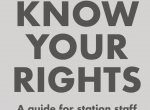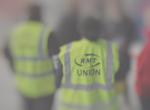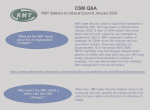- Get the latest stations news on your Ipad here
Similar topics:
Attached documents
By RMT London Transport Region's Political Officer
As promised, here’s what every station supervisor has been waiting for. In this second of our Special Issues of the Political Report, our guest columnist discloses what’s in store.
Resist the cuts
The Institute of Fiscal Studies (IFS) has recently released a survey illustrating how families are now suffering the worst real fall in living standards in 30 years! This is a direct result of the Tory cuts. Meanwhile, the employers are making the most of the recession, restructuring industry to squeeze out the greatest level of productivity per person in order to raise profitability. London Underground is no different. They are preparing their attacks now. We too need to prepare to resist.
This November, potentially, over 2 million public sector workers will be on strike. It could mark a qualitative leap in the fight against the cuts following the 26 March demonstration and the co-ordinated public sector strikes on 30 June. We too have a role to play in the growing rebellion. However, it is also critical that we understand what exactly it is we’re fighting. Station Supervisors
The Station Supervisor is no more. At least that’s how it’ll end. LU’s vision is that the Station Supervisor will become a “Team Leader” obsessed with customer flowcharts, graphs & scorecards and with raising productivity & flexibility to infinity & beyond.
What’s in a name?
Presently, the Station Supervisor role is focused on station assets and operational functions predicated on ensuring the safety of staff and passengers as priority. ‘Team Leaders’ will be different. Their focus will be customer service and an explicit managerial role that aims to provide customer satisfaction through a model of driving each worker to their limit, increasing their productivity and stretching their flexibility to meet targets and exceed results recorded each week on scorecards. (There are rumours that in future we’ll all start our shifts with a team morale-boosting session beginning with quiet contemplation of the greatness of our Chief Exec, followed by vigorous facial muscle exercises to prepare for 8 hours smiling at management, and finally five minutes of chanting “I am a mere cog in the glorious and profitable LU machine”. But of course these are just rumours at this stage...)
What’s wrong with supervisors?
As far as LU are concerned, there’s far too many. What they’re looking at is cutting out the cost of the double supervision, the night-turns and all those reserves (particularly in central London, all on SS1 pay). Station supervisors and DSM’s amount to nearly 40% of the stations’ staffing numbers and cost LUL over £100M a year.
Their Plans
- They’ve already conned some supervisors into thinking that doing some of management’s job for them (CMS, PnD’s etc) is a good route to promotion, but now they’ve decided to go the whole hog and make you a manager without promotion, so at no cost to LUL and at the expense of the DSM’s job in the process (we’ll come back to that in a later issue). So that’s all the extra responsibility with no extra pay. A bonus for management will be the impact this has on sowing divisions within the workforce in each station and undermining our industrial unity and union strength.
- Team Leaders will be accountable for station performance and will form the first line of management. They will take direct responsibility for deployment of staff.
- Team Leaders will be ‘liberated’ from their offices and roam the booking hall areas assessing, observing and pouncing on any slacking in the Team work.
- In the outer reaches of the tube, Zones 3-9, Team Leaders will be responsible for 5 or more stations. There will be no night-turns - that’ll be handed over to private contractors.
- In the smaller Section 12 stations, Team Leaders will patrol the booking hall area by day. By night they will be responsible for 3 stations minimum.
- In the larger Section 12 stations Team Leaders and Assistants will fulfill the necessary station criteria. The separate grade of SCRA will be withdrawn. A and B above, but also parts of C, will include remote monitoring of stations.
Job cuts
The idea is to utilise to the fullest new technology (Wave and Pay) and staff knowledge, productivity and flexibility to enhance efficiencies and savings. The immediate savings from these changes would be made up from hundreds of jobs losses (combined supervisors and DSM’s).
Immediate knock-on effects
- There will be a further reduction in station groups following OSP1. Fewer/Larger groups.
- There will be a further reduction in establishment staffing numbers per group.
- There will be roster changes again!
- Changes to cover arrangements. Presently, each group is allocated 37.5% fixed level cover. Management want to do away with this and bring in 30% fixed overtime allowance as a substitute to cover
- In addition, management want to use the ‘overtime substitute’ as a means to break what they call the ‘inflexibility’ of rostered duties i.e. They want to do away with staff getting ‘settled in’ on a roster where they know what they are doing on a month to month, year to year basis. They want to shake it up a bit in the name of flexibility.
- Increase in SRT and ICSA’s
- There will be the obligatory attacks on our conditions. For instance, the 15 banked rest days gained through the Stations Shorter Working Week we be no more!
(More on attacks on policies, procedures, pay and conditions in future editions).
Prerequisites
Management need various prerequisites for their plans to work. One they have: the Rule Books (a misnomer if there ever was one). Secondly, they’re deliberately turning a blind eye to ‘baby-sat’ stations that are appearing across the combine like a bad infant rash in preparation for unsupervised stations. Additionally, in an attempt to further undermine supervisor jobs, but the DSM role as well (PGI’s), in some areas ‘Station Engagement Inspectors’ working for APD have been carrying out inspections at stations and reporting faults (both traffic and non-traffic hours). Thirdly, they need to reduce stations minimum numbers (they have already begun to do this in such a way as to avoid breaching legislative requirements i.e. Section 12 - more on this later). Fourthly, they need volunteers to smooth the way for them by establishing working practice. Take heed, don’t carry out functions you are not licensed for, or that are outside your job description. Feeling safe as a train operator? Seriously... Don’t! The next Special Issue is dedicated especially to you.
- 6218 reads






